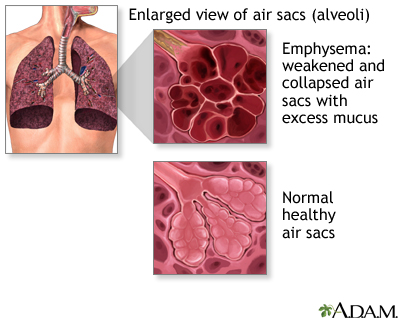Pregnancy SmartSiteTM
Chronic obstructive pulmonary disease - emotions; Stress - COPD; Depression - COPD DefinitionPeople with chronic obstructive pulmonary disease (COPD) have a greater risk for depression, stress, and anxiety. Being stressed or depressed can make COPD symptoms worse and make it harder to care for yourself. InformationWhen you have COPD, caring for your emotional health is just as important as taking care of your physical health. Learning how to deal with stress and anxiety and seeking care for depression can help you manage COPD and feel better in general. COPD and Your EmotionsHaving COPD can affect your mood and emotions for several reasons:
All of these factors can make you feel stressed, anxious, or depressed. How Your Emotions can Affect COPDHaving COPD can change how you feel about yourself. And how you feel about yourself can affect COPD symptoms and how well you care for yourself. People with COPD who are depressed may have more COPD flare-ups and may have to go to the hospital more often. Depression saps your energy and motivation. When you are depressed, you may be less likely to:
Stress is a known COPD trigger. When you feel stressed and anxious, you may breathe faster, which can make you feel short of breath. When it is harder to breathe, you feel more anxious, and the cycle continues, leading you to feel even worse. How to Manage Stress and Avoid DepressionThere are things you can and should do to protect your emotional health. While you cannot get rid of all the stress in your life, you can learn how to manage it. These suggestions may help you relieve stress and stay positive.
Feeling angry, upset, sad, or anxious at times is understandable. Having COPD changes your life, and it can be hard to accept a new way of living. However, depression is more than occasional sadness or frustration. Symptoms of depression include:
If you have symptoms of depression that last for 2 weeks or more, contact your health care provider. You do not have to live with these feelings. Treatment can help you feel better. When to Call the DoctorContact your doctor if:
You should also call your doctor if your COPD symptoms get worse, despite following your treatment plan. If you or someone you know is thinking about suicide, call or text 988 or chat 988lifeline.org. You can also call 1-800-273-8255 (1-800-273-TALK). The 988 Suicide and Crisis Lifeline provides free and confidential support 24/7, anytime day or night. You can also call 911 or the local emergency number or go to the hospital emergency room. DO NOT delay. If someone you know has attempted suicide, call 911 or the local emergency number right away. DO NOT leave the person alone, even after you have called for help. ReferencesGlobal Initiative for Chronic Obstructive Lung Disease (GOLD) website. Global strategy for the diagnosis, management, and prevention of chronic obstructive pulmonary disease: 2023 report. goldcopd.org/2023-gold-report-2/. Accessed October 26, 2023. Han M, Lazarus SC. COPD: Diagnosis and management. In: Broaddus VC, Ernst JD, King TE, et al, eds. Murray and Nadel's Textbook of Respiratory Medicine. 7th ed. Philadelphia, PA: Elsevier; 2022:chap 64. | ||
| ||
Review Date: 10/13/2023 Reviewed By: Linda J. Vorvick, MD, Clinical Professor, Department of Family Medicine, UW Medicine, School of Medicine, University of Washington, Seattle, WA. Also reviewed by David C. Dugdale, MD, Medical Director, Brenda Conaway, Editorial Director, and the A.D.A.M. Editorial team. View References The information provided herein should not be used during any medical emergency or for the diagnosis or treatment of any medical condition. A licensed medical professional should be consulted for diagnosis and treatment of any and all medical conditions. Links to other sites are provided for information only -- they do not constitute endorsements of those other sites. No warranty of any kind, either expressed or implied, is made as to the accuracy, reliability, timeliness, or correctness of any translations made by a third-party service of the information provided herein into any other language. © 1997- A.D.A.M., a business unit of Ebix, Inc. Any duplication or distribution of the information contained herein is strictly prohibited. | ||


 COPD (chronic obst...
COPD (chronic obst...
